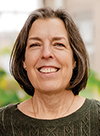Religious making a difference
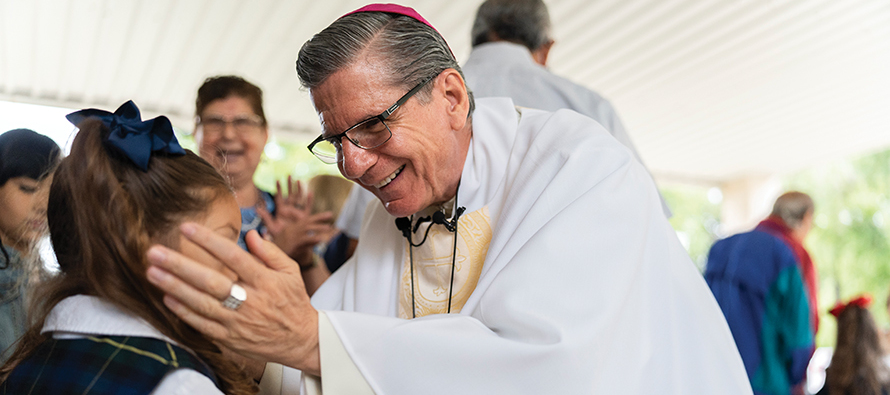
Archbishop Gustavo Garcia-Siller, M.Sp.S. talks with a girl affected by the Uvalde massacre. (Photo courtesy of Catholic Extension)
LATINO MEN AND WOMEN are a major part of religious life because they are a major part of the American church. Here are some people making a difference in their sphere of consecrated life. Whether working in leadership roles, praying for the needs of the world, or teaching the faith to young people, sisters, nuns, priests and brothers each day are building up the Kingdom.
His mission: Tend to the flock, especially when hurting
Archbishop Gustavo García-Siller, M.Sp.S.
Gun violence and immigrant needs are two front and center issues in San Antonio that have pushed Archbishop Gustavo Garcia-Siller, M.Sp.S. to take strong stands. A member of the Missionaries of the Holy Spirit, García-Siller has become known nationally for his outspoken comments urging immigration reform and gun control.
“We have made guns an idol in this country,” García-Siller said on MSNBC. “I believe with my whole heart that gun control has to take place in a more radical way.” His remarks followed his visits to families hurt by the mass killing of 21 people at an elementary school in Uvalde, Texas. García-Siller called for Catholics to walk with those suffering from the violence and to stay with them during the long process of healing.
Shortly after the Uvalde massacre in 2022, 53 migrants were found dead in an overheated tractor-trailer, with other migrants on the truck fighting for their lives. After visiting the survivors, the prelate said, “It is not permissible for anyone in our society to remain idle and look the other way in the face of the humanitarian crisis caused by unregulated migration,” he said. “We all have a role to play in solidarity with people fleeing in search of opportunities for development.”
Although García-Siller makes headlines for his remarks on controversial issues, his day-to-day ministry is similar to any bishop: He focuses on teaching, evangelization, and leading the nearly 800,000 Catholics in his archdiocese. Having grown up in Mexico, he is one of 26 bishops, archbishops, and auxiliary bishops in the United States who have an Hispanic heritage.
He once told VISION this when asked about vocations: “I had dinner last week with 17 people considering religious life or priesthood. I think they could see the happiness I’ve found in this life. There’s such a richness in knowing God and giving your life to the community—not just ‘me and God’ but God working in me for the sake of the community. Why not give it your life?”
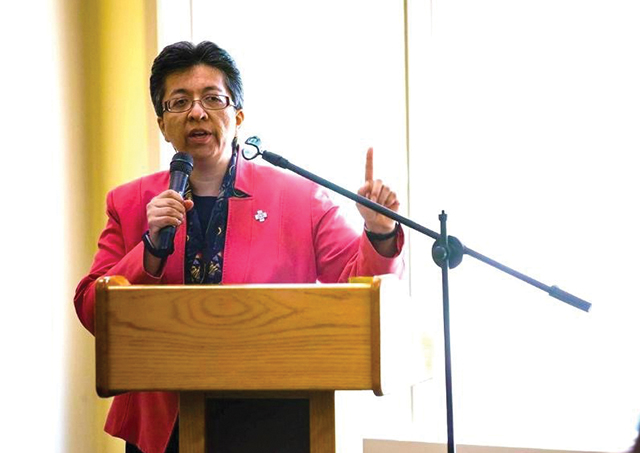
(Photo courtesy of the Sisters of Charity of the Incarnate Word)
Multi-talented sister
Sister Teresa Maya, C.C.V.I.
One label won’t do it for Sister Teresa Maya, C.C.V.I. The Mexican-American sister currently is on sabbatical after serving in leadership for her community. However, ever since she joined the Sisters of Charity of the Incarnate Word in 1994, she has worn many hats. She began as a teacher, served as a principal, taught college history courses, was in leadership for her own congregation for 14 years, and led a group of sister-leaders for 14 years.
During her varied service, she has advocated for immigrants and migrants, encouraged a multi-racial, intercultural church, and urged an embrace of religious life during a time when religious communities are undergoing dramatic demographic change.
One mainstay for her has been community: "There is nothing more important, more radical, more necessary for us than to lean into our apostolic call to nurture and foster community wherever we find it, wherever we are, with whatever means we have," she told the Leadership Conference of Women Religious during an address.
She has also spoken about and led workshops on “interculturality,” a way of living whereby people of diverse backgrounds thrive alongside people of dominant cultures. In an interview with MessyJesusBusiness.com, Maya spoke about how to bring the church toward a more holistic intercultural way of life: “We have to go back to Jesus. If we go back to the gospel, we see Jesus hanging out with a lot of different people: women, people considered unclean, lepers, tax collectors.” She also encouraged Catholics to get to know people different from themselves by attending Mass with people of other languages and traditions.
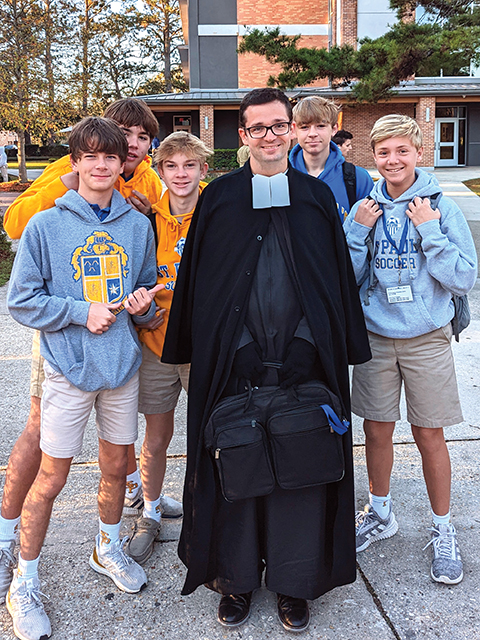
(Photo courtesy of Brother Javier Hansen, F.S.C.)
Keeping the fire burning for young Catholics
Brother Javier Hansen, F.S.C.
What do young adult Catholics seek from the church? That was one of a number of broad questions put to young Catholics several years ago who were delegates at an international gathering preceding a “synod” (or gathering) of bishops to address young people, faith, and vocational discernment.
Brother Javier Hansen, F.S.C. was selected to be a young adult delegate, representing the United States along with a young lay woman and man. Several years later, the experience remains an important one in his life, and he continues to live the lessons he learned.
“I belong to the Brothers of the Christian Schools, and we are dedicated to education of young people, so it was not a one-time gathering for me,” he says. As a religion teacher at St. Paul High School in Covington, Louisiana, each day Hansen makes an effort to convey the faith. “I try to dive into the culture where I am teaching,” he notes so that he comes to know the students personally and build a rapport. He also connects with them outside the classroom, attending sports events and coaching an Ultimate Frisbee team.
His time with young people from around the world at the pre-synod meeting and his time talking to groups and media outlets about the messages of the synod have inspired him to keep working on his teaching and pastoral skills.
While the synod’s emphasis on reaching and involving young people has been heard in many corners of the church, says Hansen, “I’d like to see the church go back every year and address these concerns…. As the pope said, the young are not the future of the church, they are the now.”
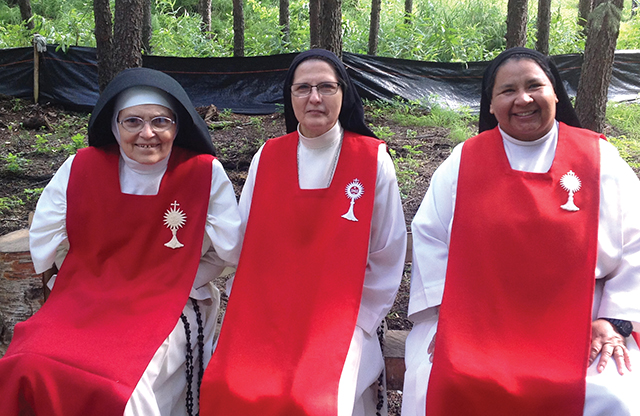
One cool move for the greater good
The Sisters of Perpetual Adoration
Consecrated life stresses an openness to go wherever you are called. Nuns from two different monasteries in Mexico have done just that, answering a call within a call. Seven nuns from tropical Guadalajara, Mexico left their convent and moved to Anchorage, Alaska at the invitation of Archbishop Francis Hurley in 1985. Hurley wanted to establish the prayerful presence of the Sisters of Perpetual Adoration, having grown up near one of their U.S. monasteries.
In 2013, another Mexican community of the Sisters of Perpetual Adoration—located in Nuevo Laredo (near the Texas border)—sent six sisters to reinforce the dwindling membership in the Alaska monastery.
“We are the only contemplative life monastery in Alaska,” the nuns declare on their website. “Our Lord has entrusted us with the great mission of being a support, through our prayer, dedication, sacrifice, generosity, and joy, not only for our Archdiocesan Church, but for all of Alaska, and offer our lives to God for the salvation of all."
The nuns rise early each day and dedicate the bulk of their day to prayer, meditation, and adoration of the Blessed Sacrament, including taking turns at prayer before the Blessed Sacrament during the night. They have time built into their daily schedule for learning English, tending a vegetable garden, and taking part in recreation and hobbies.
"There's so much suffering in the world today," Sister Alicia Valencia, A.P.S.S. told the Anchorage Daily News. "To hear God is helping (people) by our prayers, it's a great experience of joy for us."
Tags
- diversity
- immigrants
- young adult catholics
- migrants
- uvalde texas
- latino men religious
- latina women religious
- archbishop gustavo garcía-siller msps
- gun violence
- sister teresa maya ccvi
- interculturality
- brother javier hansen fsc
- sisters of perpetual adoration
Related
- Religious seekers in legal limbo
- Mercy meets at the border
- Religious life: The call continues
- Vocation Basics: Essentials for the vocation journey
- Community life: A place to call home
- A charism encourages a caring ministry
- The four main types of religious life
- Our newest religious possess an age-old Christian virtue: hope
- Celibacy steeped in a whole lot of love
- Benedictines believe in balance Read More
Most Viewed
- Find your spirituality type quiz
- FAQs: Frequently asked questions about vocations
- Celibacy quiz: Can you live a celibate life?
- Resources for older discerners or those with physical and developmental differences
- About Vocation Network and VISION Guide


